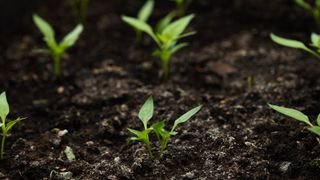[ad_1]
As spring rolls around, gardeners are excited about setting up their flower beds and watching bulbs planted weeks ago start to bloom. But before you start sowing seeds, Monty Don has shared his top tips for getting the most out of your flowers this spring.
Always ahead of the curve with garden trends, Monty Don has released his monthly advice on what gardeners should be doing in April to get the most out of their gardens as the warmer weather approaches.
So if you’re taking part in the wildflower border trend or simply want to add a splash of colour to your outdoor space here’s what you need to do for showstopping floral displays.
Monty Don’s sentimental floral top tip
Starting his monthly blog post, Monty expresses his frustration at the unusual spring weather. He says, “It has been a very poor Spring season for daffodils because – I suspect – they had so much rain in Autumn and Winter that they have developed excess foliage at the expense of flowers.”
And whilst the season has not been kind to daffodils, Monty does point out that tulips are indeed coming through and potted bulbs are weathering the storm after being kept out of the heavy rain. Although the rain isn’t always welcome it does give gardeners a chance to try out the rainscaping trend and also reap the benefits of rainwater harvesting.
Should you have not yet managed to start sowing your seeds, the time is now and Monty has the perfect method, passed down the generations this trick will allow your seedlings all the room to grow and cut down on your waste too.

(Image credit: Getty Images)
Monty starts the advice by saying, “We should do everything we can to reduce the amount of plastic in our gardens. The first stage in that process is to reuse any plastic seed trays and pots that you have – and to look after them so you can continue to use them for as long as possible and not replace them.”
Alternatively, if you’re looking for more sustainable garden ideas, you can use eggshells in your garden as seedling starters which will also reduce plastic and cut costs.
An even better solution? “The easiest way to do this is to return to a method that our parents and grandparents always used for any hardy seeds, which is to make a seed bed,” explains the professional gardener.
A seedbed is a dedicated piece of ground that can be a couple of metres square or less, Monty says seeds can be sown in short, closely spaced rows before you transplant the seedlings to their final proper positions. This is especially useful if you’re looking for help with vegetable gardening for beginners, seedbeds are ideal for veggies!
He suggests cultivating the soil until you have a fine tilth which you can pick up by the handful and run through your fingers. Once you’ve got this consistency you can rake it smooth and sow your seeds in short rows, making sure to label them clearly.
“It requires no materials, no bought-in compost, less watering and minimal preparation. It also is likely to produce healthier plants because from the word go the emerging seedlings form a relationship with the microbes in the soil on which almost all their health depends,” says Monty.
Once your seedlings have grown to a significant size, large enough to be handled then Monty suggests you lift the seedling with a trowel and transplant them with as much soil attached to its roots as possible. After you’ve moved the growing plant into your new pot or bed make sure to water it in well so that it scarcely notices the relocation and change in conditions.
Although Monty’s tip is one passed down by generations, its effectiveness is nothing short of perfection. Not only does a seedbed save you from using plastic pots, but it also creates a space which you can use over and over again for flower beds, vegetable patches or even more seed sowing next year.
[ad_2]
Source link